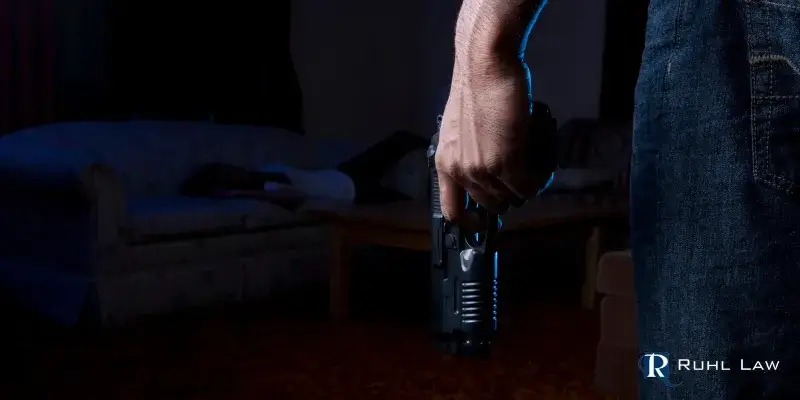Port Charlotte Violent Crime Lawyer
Port Charlotte Violent Crime Attorney
There are very few charges in Port Charlotte that have as much potential impact on your future, your freedom, or your family as a violent crime conviction. Florida law takes violent crimes very seriously. For this reason, it is imperative that you seek a skilled and qualified Port Charlotte violent crimes lawyer as soon as possible if you are facing charges for a violent crime. Your attorney can advocate on your behalf, protecting your rights no matter what your alleged crime.

Violent Crimes Representation in Port Charlotte, FL
Our team of attorneys at Ruhl Law, P.A., understands the gravity of what is at stake in representing our clients facing criminal charges. That’s why we offer compassionate legal counsel combined with comprehensive experience in every case we represent, working diligently to obtain favorable outcomes for all our clients.
As trial attorneys, we fight not only for your individual rights but also against the unjust system that unfairly discriminates against many individuals. Law enforcement can fixate on securing a conviction without full consideration of the facts or evidence in the case. With our lawyers in your corner, you can be protected against injustice and have your rights and interests upheld. Reach out today to learn how we can help defend your case, potentially avoiding conviction.
What Is Florida’s Violent Crime Law?
In Florida, a violent crime is one in which an aggressive and intentional act threatens, harms, or seeks to harm another person. If convicted, violent crimes are often charged as felonies, leading to prison time, the loss of certain civil rights, and a permanent criminal record. The actual penalties imposed will be dependent on the type and severity of the crime.
Violent crimes tend to be prosecuted to the fullest extent of the law due to the seriousness that violent crimes pose to the community. Florida often ranks highly among the most dangerous states in the nation for crimes, leading courts to severely punish those convicted. For this reason, it is imperative that you obtain an aggressive defense attorney to go up against the state’s prosecutors, who can rightly defend your case and fight on your behalf.
What Kinds of Violent Crimes Do We Defend?
The violent crimes lawyers at Ruhl Law, P.A. have extensive experience handling a wide range of criminal cases, including some of the most challenging crimes defense cases there are. The following represents the most common cases we take on. If you are facing charges in any one of these or some other crime, reach out to a defense lawyer as soon as possible to begin building your defense.
Domestic Violence
Domestic violence generally refers to an act or pattern of violence between people in a current or past familial or intimate relationship. Not limited merely to physical violence, domestic violence can include emotional, psychological, financial, or sexual abuse towards another.
While any acts of violence would be criminal, violent acts towards family members, partners, or members of the same household garner special classification since those crimes tend to carry harsher penalties and additional measures intended to protect the harmed, such as restraining orders and other legal protections.
Assault
Any intentional threat of violence towards another person, whether by word or act, that creates a reasonable fear in the other person is considered assault. In Florida, the threat must also be coupled with both the apparent ability to carry out the threat and the belief in the one being threatened that danger is, in fact, imminent.
Assault can range from misdemeanor charges for simple assault to serious felony charges for aggravated assault. A crime is considered aggravated if certain factors are present, such as the presence of a deadly weapon.
Sex Crimes
Sex crimes in Florida encompass a wide range of unwanted or coerced sexual conduct. For example, non-consensual sexual intercourse, also known as rape, is referred to legally as “sexual battery.” Other offenses include, but are not limited to, sexual assault, prostitution, child pornography, and lewd and lascivious behavior.
The state imposes severe penalties on these crimes in order to treat them seriously and further discourage future behavior. Specific penalties will vary based on considerations, such as the victim’s age, whether force was used, and whether the offender has any prior convictions. These penalties tend to involve heavy fines, imprisonment, and mandatory registration as a sex offender.
Murder
Any unlawful killing of another person constitutes murder. From there, Florida divides murder into differing degrees based on both circumstances and intent. Third-degree murder involves unintentionally killing someone while committing a non-violent felony.
Second-degree murder occurs when someone kills another person without premeditation, usually through an act that shows no regard for human life. This is considered having a “depraved” mind when a person demonstrates or shows no signs of remorse, guilt, or hesitation at ending the life of another person.
First-degree murder typically involves premeditation, but some situations may constitute murder in the first-degree even without premeditation. First-degree murder can include unlawful killing that occurs during certain felonies, such as robbery, kidnapping, or sexual battery.
Theft Crimes
Theft crimes are any offenses in which another person’s property is taken or removed without authorization. The value of the property stolen usually determines the crime’s severity.
Petit theft encompasses theft of items valued under $750, while grand theft involves goods valued over that amount and can lead to felony charges. Robbery is a theft crime in which money or property is taken from a person by use of violence, force, or threat. Burglary involves illegally entering or remaining on a property with the intent to commit a crime there.
Trafficking
Both drug and human trafficking represent extremely serious crimes in Florida, each of which is treated severely by state courts. Drug trafficking involves knowingly selling, purchasing, delivering, manufacturing, bringing into the state, or being in possession of a qualifying amount of illicit or controlled substances.
Drug trafficking is a felony offense whose penalties carry mandatory minimum prison sentences, substantial fines, and limited freedoms. The use of firearms or violence in drug trafficking can lead to enhanced penalties.
Human trafficking involves the use of force, fraud, or other means of coercion to exploit individuals. Human trafficking is most commonly done in connection with the illegal sex trade. Convictions are prosecuted as a first-degree felony and include lengthy prison sentences, hefty fines, and mandatory restitution for the victims.
In most cases, human trafficking is committed in conjunction with other crimes, which can increase the penalties and add charges to the case.
What is Florida’s 10-20-Life Law?
One area in which Florida’s laws are particularly strict is in their stance against crimes involving firearms. Their infamous 10-20-Life law outlines the minimum sentences imposed on those convicted of violent crimes that involve a firearm. In its law, Florida establishes the following punishments:
- 10-year minimum sentence for having a firearm out or showing it during the commission of another crime.
- 20-year minimum sentence for using or firing a gun during the commission of another crime.
- 25-year minimum sentence, up to life, for shooting someone with a firearm during the commission of another crime, causing them to be injured or killed.
These penalties represent the seriousness with which Florida treats violent crimes.
What Kind of Defense Options Do I Have in a Violent Crimes Case?
In cases involving violent crimes, there are several potential options available for defending your case. Some of the most common defenses are:
- Self-defense. Florida’s “Stand Your Ground” law removes the duty to retreat before force is a legally acceptable response, no longer requiring individuals to first attempt to escape a situation. So long as you were located lawfully and were not engaged in any criminal activity, self-defense is a viable defense. The legal protections for self-defense are also true in situations where one is defending someone else, as well.
- Lack of intention. You may be able to effectively defend your case by asserting that the injury or death resulted from an accident rather than any willful act of intention or reckless behavior. Often, witnesses or law enforcement can misunderstand or misinterpret the details of a situation that led to the alleged actions.
- Mental incapacity. When the defendant is not mentally capable of understanding the true nature of their actions or the wrongfulness of the behavior because of a mental illness or other impairment, they may no longer be held legally liable for their actions.
- If you were forced to commit a violent act or crime under the threat of imminent harm to you or someone else, you could have your charges dismissed or minimized.
Most of these defenses assume the alleged act took place and seek to better put it within the proper context to demonstrate the non-violent and non-criminal nature of the act. In many cases, the alleged act in question was not committed by the defendant at all. In these cases, your attorney can help establish your alibi, challenge the evidence of the case, and provide the reasonable doubt required to prevent a conviction.
Your Port Charlotte Violent Crimes Attorney
If you are facing charges for a violent crime, you need someone in your corner to protect your rights and fight to dismiss or minimize your charges. Our attorneys at Ruhl Law, P.A. offer strong defense strategies with compassionate and non-judgmental representation. Let us help you overcome the challenges you are facing and work to secure your reputation, freedom, and future. Contact our Port Charlotte office today to get started working with an accomplished criminal defense attorney in Charlotte, Sarasota, or Desoto Counties by calling 941-505-7845 or 855-784-5529 today.
© 2025 Ruhl Law, P.A. • All Rights Reserved.



